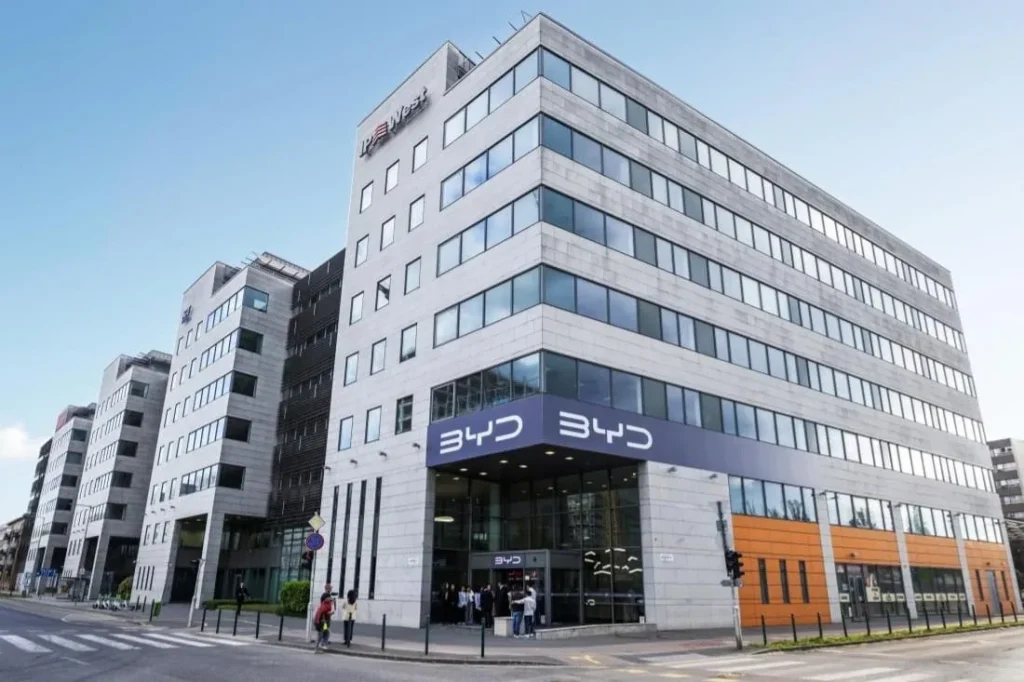The Chinese electric car manufacturer BYD is further expanding its activities in Hungary and plans to establish its European headquarters in the capital Budapest. A new European research and development centre is also to be built there.
The new headquarters will be built in the 11th district of the Hungarian capital and, according to the company, will create “thousands of highly qualified jobs,” with media reports referring to an initial 2,000 jobs. There are also plans to work closely with at least three Hungarian universities to strengthen training and further education programmes and promote young talent.
BYD is thus consolidating its localisation strategy and further strengthening its presence in Hungary. With the new European headquarters, BYD will have a total of five locations in Hungary: BYD has been building electric buses for the European market in Komárom since 2017, and electric car production is also set to begin in Szeged at the end of 2025. There will also be a battery assembly plant in Fót and one in Páty.
BYD’s research and development activities in Hungary are to start with two ambitious projects. The focus is on the integration of intelligent driving functions and the development of “advanced next-generation electrification technologies,” as stated in the press release.
Collaboration with startups and suppliers
BYD has further stated that it is focusing on cooperation with domestic startups and suppliers. The company also wants to achieve results in the area of patents that emerge directly from the new centre. BYD writes that around 90 per cent of the employees at the R&D centre will have a university degree – a clear commitment to local innovative strength.
BYD CEO Wang Chuanfu emphasised the importance of the project for the company’s European strategy: “Establishing BYD’s European headquarters in Hungary is a natural progression. As the core hub for BYD’s European operations, the headquarters will focus on three key functions: sales and after-sales services, vehicle certification and testing, and localised vehicle design and feature development.”
Support from the Hungarian government
The announcement was made at a high-profile ceremony in Budapest, which was attended by Hungary’s Prime Minister Viktor Orbán and the Governor of the Chinese province of Guangdong, Wang Weizhong, among others. Hungary’s Minister of Foreign Affairs and Trade, Péter Szijjártó, and BYD Vice President Stella Li also signed the agreement.
Prime Minister Orbán expressed his delight at the long-term investments: “Our goal is for foreign investors to bring development capacities to Hungary. Not only manufacturing, but also development capacities. Our idea has always been that the factories arrive first, then the factories’ development centres arrive, and finally the research centres arrive.”
For Orbán, the fact that his country voted against the EU’s special tariffs on electric cars has now paid off. Shortly afterwards, the Chinese government instructed car manufacturers to only invest in EU countries that do not support the special tariffs. As a consequence of this, production of the Leapmotor T03 was withdrawn from Poland, which had voted in favour of the special tariffs.
BYD wants to become the leading brand in Europe
With its plans for a new European headquarters, including research and development, BYD is emphasising its ambition to play a leading role in the European market for electric vehicles. The company is already selling models such as the Dolphin, which will also be built at the new BYD plant in Szeged, in Europe.
The combination of regional production, localised research and close cooperation with Hungarian institutions should not only contribute to the economic development of the region, but also play a key role in shaping Europe’s energy transition. With the establishment of the European headquarters in Budapest, BYD is opening a new chapter – one that will accelerate the green mobility revolution in Europe. Last but not least, BYD once again emphasises how important the markets outside China are to the company. The company aims to sell every second car outside its home market by 2030 – last year it was only every tenth car.
Source: Info via email, cnevpost.com

